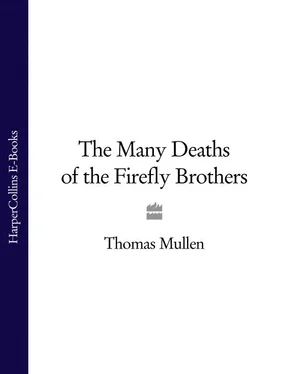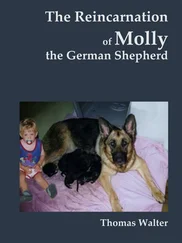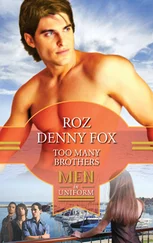“Good, good.” Douglasson was in his late forties, gray-haired, heavy enough to appear sufficiently well-off but not so slovenly as to scare away a prospective client. Much of the politically connected real-estate attorney’s current work involved foreclosures and searching the titles of vacant or disputed property. Even bad times resulted in windfalls if you were standing on the right hilltop.
Douglasson’s decades-long assistant had passed away in ‘30, a few months after the conviction of Patrick Fireson and the foreclosure of the last family store, which Weston and Whit had been desperately trying to keep afloat. Douglasson had been tangentially involved in Pop’s horribly timed real-estate gambit, and had met Weston at a few meetings, where he was impressed by the young man’s quiet perseverance and seriousness. After Pop’s trial, Douglasson offered Weston a job as a legal assistant, which Weston happily accepted, as he’d been without work for weeks. Weston saw the offer as a sign of the man’s decency, whereas Whit took it as a sign that Douglasson had something to feel guilty about. How can you work for him? Whit had accused his brother. He’s just another rich man who helped Pop get into trouble and then didn’t lift a finger once it all blew up. But what choice did Weston have? At the time, Jason was still in jail on his second rum-running conviction, Uncle Joe was drinking himself into oblivion, and Weston and Whit had barely earned a cent since the store closed.
“How is your mother doing?”
“Fine, sir. Looking forward to spring, like the rest of us.”
Douglasson quickly listed new assignments for Weston, who carefully took notes, wondering why his boss had felt the need to do this in his private office; usually he boomed such orders over the intercom.
“There’s one more thing I wanted to mention, Weston.”
“Yes?” His stomach tensed. To save money, he was forgoing breakfast, apart from a cup of coffee. This worked well enough on days that produced little stress, but any time his quiet routine was disrupted his insides would feel stabbing pains like the ones he’d endured during Pop’s ordeal.
“I’m afraid I need to talk to you about your brothers.”
Weston sat up straighter and folded his hands on his lap, letting the pen lie still atop his pad. He tended to remember, with perfect clarity, whatever people said about his brothers.
“Yes, sir?”
“I’m sure this is difficult for you…I’ve been very satisfied with the work you’ve done for me these last—what is it, now, three years?”
“Yes, sir, three and a half years now.” Jesus, was he being fired? He was completely, completely still, as if Douglasson were one of those nervous cops aiming a revolver at him. What was the difference between being fired and being fired upon?
“Well, then, I knew it was a bit of a risk hiring you, given your lack of experience, but it turns out it was the right decision all along. I don’t regret it. And I knew, of course, about Jason’s brushes with the law, the bootlegging and whatnot. It’s a shame so many people were sent the wrong way by that foolish Prohibition business, so I was willing to give him the benefit of the doubt on that. Bank robbing, however, is another matter. As is murder.”
“Sir, I—” Weston stammered for a moment. “You know I have nothing, absolutely nothing, to do with any of—”
“Yes, yes, of course. I realize you’re an innocent man caught in an awkward position. But what I need you to understand, Weston, is that this awkward position is beginning to ensnare others.”
Weston practiced breathing.
“As I’m sure you know, police in numerous states are trying to find your brothers, as is the federal Department of Justice. They are leaving no stone unturned, and that means they’re investigating everything they can not only about your brothers but also about their associates, past and present. Including their relatives. And those who employ their relatives.”
From the fourth floor, the sound of street traffic was eerily nonexistent. Weston reached up to prevent his glasses from sliding down his sweaty nose.
“The police have…contacted you?”
“Now, Weston, a good deal of my business comes from state and local government, or from banks that are pointed my way by various officials. It has been brought to my attention that employing the brother of two famous outlaws is not the wisest thing for one in my position. That my past—albeit brief and entirely legal—association with your father is a black mark made worse by your presence here.”
The walls of Weston’s throat were two pieces of sandpaper.
“Now, I’m not such a helpless codger, Weston, and I can hold my own against a little friendly pressure. I’ve been here a long time, as has my family, and my business is strong. But I am hoping, quite fervently, that this matter will pass soon. Perhaps your brothers will…turn themselves in, and justice will be done as, er, as painlessly as possible. Otherwise, the pressures on my firm may mount.”
“I’m very, very sorry if I’ve caused you any trouble at all, sir. And I want—”
“Now, now, it’s no trouble at all.” He waved his hand. “But, Weston, I want you to think very carefully about what I’ve asked you this morning. And perhaps we can do what we can to make things right.”
“I’m, I’m sorry, sir—um, what exactly have you asked me?”
Douglasson placed his hands on the large ash table, which that morning was immaculate, as it was cleaned to a shine each Friday evening by Weston himself. Then he took a business card from the top drawer of his desk and handed it to Weston.
“It would be in everyone’s best interests for you to get in touch with this gentleman.”
The card belonged to one Cary Delaney. Below the name was a phone number and a Chicago address, and above it was the crest for the Justice Department’s Bureau of Investigation.
Weston placed the card in his shirt pocket. “Of course, sir.”
The shirt was old and thin—it had been his father’s—and he could feel the card’s corners poking at his chest the rest of the day.
He wondered if this Agent Delaney had been one of the men he had seen leaving his mother’s house two weeks earlier. Weston had stopped by after work to have supper with Ma and Aunt June, and when he saw how bare the pantry was he had run out to buy groceries. That task still seemed odd, after growing up in a shop-owning family. One of the new supermarkets had opened up a few blocks away, but whenever he went there he felt ill. Weston remembered the first time his father had allowed him to run the register, remembered the bad days when they’d had to accept scrip from tire workers whose factory had run out of cash for their pay. He loathed buying groceries—maybe this was why he’d grown so thin—and the only reason he did it for Ma was to spare her the same pain.
He had been walking back to her house that night, a cold one, late March, when he heard his mother yelling.
“Do you have sons, Detective?! Do you know what it’s like to worry about your children?!”
Twenty yards away, two men in dark suits and snap-brim hats were standing at the edge of the Firesons’ front lawn, shoulders turned as if they had been leaving but were now reconsidering. Weston’s mother was on the porch, the door open. She wasn’t wearing a coat, but that’s not why her fists were clenched.
At the risk of dropping the groceries, Weston jogged past the last two houses and onto his mother’s lawn.
“Some of the people that they’ve killed had sons, ma’am,” one of the men was saying, his voice accented like a cowboy from the Westerns. “Have you considered that? I don’t think they have.”
Читать дальше












